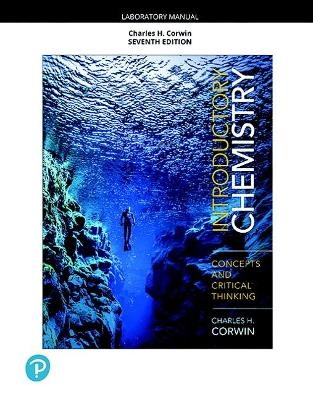
Laboratory Manual for Introductory Chemistry
Pearson (Verlag)
978-0-13-472014-2 (ISBN)
Prepare introductory chemistry students for laboratory and provide a safe experience
Emphasizing environmental considerations, Corwin’s acclaimed Laboratory Manual for Introductory Chemistry offers a proven format of a pre-laboratory assignment, a stepwise procedure, and a post-laboratory assignment. More than 500,000 students to date in Introductory Chemistry, Preparatory Chemistry, and Allied Health Chemistry have used these experiments successfully. The 7th Edition continues to evolve with increased sensitivity to environmental and safety concerns in the laboratory. Recycle icons in the margin of each procedure alert students to recycle chemical waste and “green chemical” indicators remind students to use the appropriate waste containers provided to dispose of chemicals. Corwin’s lab manual can be packaged with any Pearson Intro Prep Chemistry book.
SAFETY PRECAUTIONS
LOCKER INVENTORY
WASTE DISPOSAL
EXPERIMENTS
1 Introduction to Chemistry
Topic: The Scientific Method
A. Instructor Demonstrations
B. Student Experiments
2 Instrumental Measurements
Topic: The Metric System
A. Length Measurement
B. Mass Measurement
C. Mass and Volume of an unknown solid
D. Volume Measurements
E. Temperature Measurements
3 Density of Liquids and Solids
Topic: Density
A. Instructor Demonstration-Density
B. Density of Water
C. Density of an Unknown Liquid
D. Density of a Rubber Stopper
E. Density of an Unknown Solid
F. Thickness of Aluminum Foil
4 Freezing Point and Melting Points
Topic: Change of Physical State
A. Cooling Curve and Freezing Point
B. Melting Point of an Unknown
5 Physical Properties and Chemical Properties
Topic: Physical and Chemical Properties
A. Instructor Demonstrations
B. Observation of Elements
C. Physical Properties
D. Chemical Properties
6 “Atomic Fingerprints”
Topic: Emission Spectra and Electron Energy Levels
A. Continuous Spectrum — White Light
B. Line Spectrum — Hydrogen
C. Line Spectra — Helium, Neon, Argon, Krypton, and Mercury
D. Identifying Unknown Elements in a Fluorescent Light
7 Families of Elements
Topic: The Periodic Table
A. Analysis of Known Solutions
B. Analysis of an Unknown Solution
8 Identifying Cations in Solution
Topic: Qualitative Cation Analysis
A. Analysis of a Known Cation Solution
B. Analysis of an Unknown Cation Solution
9 Identifying Anions in Solution
Topic: Qualitative Anion Analysis
A. Analysis of a Known Anion Solution
B. Analysis of an Unknown Anion Solution
10 Analysis of a Penny
Topic: Writing and Balancing Chemical Equations
A. Instructor Demonstrations-Combination Reactions
B. Decomposition Reactions
C. Single-Replacement Reactions
D. Double-Replacement Reactions
E. Neutralization Reactions
F. Percentages of Copper and Zinc in a Penny
11 Determination of Avogadro’s Number
Topic: Avogadro’s Number and the Mole Concept
A. Calibrating a Dropper Pipet
B. Calculating Molecules in the Monolayer
C. Determining Avogadro’s Number
12 Empirical Formulas of Compounds
Topic: Empirical Formula
A. Empirical Formula of Magnesium Oxide
B. Empirical Formula of Copper Sulfide
13 Analysis of Alum
Topic: Percent Composition and Empirical Formula
A. Percentage of Water in Alum Hydrate
B. Percentage of Water in an Unknown Hydrate
C. Water of Crystallization in an Unknown Hydrate
14 Decomposing Baking Soda
Topic: Mass—Mass Stoichiometry and Percent Yield
A. Percent Yield of Na2CO3 from Baking Soda
B. Percentage of NaHCO3 in an Unknown Mixture
15 Precipitating Calcium Phosphate
Topic: Mass—Mass Stoichiometry and Percent Yield
A. Percent Yield of Ca3(PO4)2 from CaCl2
B. Percentage of CaCl2 in an Unknown Mixture
16 Generating Hydrogen Gas
Topic: Mass—Volume Stoichiometry and Combined Gas Law
A. Molar Volume of Hydrogen Gas
B. Atomic Mass of an Unknown Metal
17 Generating Oxygen Gas
Topic: Mass—Volume Stoichiometry and Combined Gas Law
A. Percentage of KClO3 in a Known Mixture
B. Percentage of KClO3 in an Unknown Mixture
18 Molecular Models and Chemical Bonds
Topic: Structural and Electron Dot Formulas
A. Molecular Models with Single Bonds
B. Molecular Models with Double Bonds
C. Molecular Models with Triple Bonds
D. Molecular Models with Two Double Bonds
E. Unknown Molecular Models
19 Analysis of Saltwater
Topic: Solubility and Solution Concentration
A. Instructor Demonstration — Supersaturation
B. Solutes and Solvents
C. Rate of Dissolving
D. Concentration of Sodium Chloride in Saltwater
20 Analysis of Vinegar
Topic: Acid—Base Titrations
A. Preparation of Standard Sodium Hydroxide Solution
B. Concentration of Acetic Acid in Vinegar
21 Electrical Conductivity of Aqueous Solutions
Topic: Net Ionic Equations
A. Conductivity Testing–Evidence for Ions in Aqueous Solution
B. Conductivity Testing–Evidence for a Chemical Reaction
C. Net Ionic Equations–A Study Assignment
22 Activity Series of Metals
Topic: Oxidation Numbers and Redox Reactions
A. Oxidation Numbers of Iron
B. Oxidation Numbers of Manganese
C. Oxidation Numbers of Sulfur
D. Oxidation Numbers of Nitrogen
E. Oxidation—Reduction Equations—A Study Assignment
F. Activity Series and an Unknown Metal
23 Organic Models and Classes of Compounds
Topic: Structural Formulas of Molecular Models
A. Molecular Models of Hydrocarbons
B. Molecular Models of Hydrocarbon Derivatives
C. Unknown Molecular Models
24 Separation of Food Colors and Amino Acids
Topic: Paper Chromatography
A. Separation of Food Colors by Paper Chromatography
B. Identification of Amino Acids by Paper Chromatography
25 Laboratory Instruments and Technique
Topic: Lab Final Exam
A. Lab Practical Exam
B. Lab Written Exam
APPENDICES
A Laboratory Burner
B Decigram Balance
C Centigram Balance
D Milligram Balance
E Volumetric Pipet
F Activity Series for Metals
G Solubility Rules
H Laboratory Notebook
I Glossary
J Answers to Prelaboratory Assignments
| Erscheinungsdatum | 02.02.2018 |
|---|---|
| Sprache | englisch |
| Maße | 229 x 269 mm |
| Gewicht | 726 g |
| Themenwelt | Naturwissenschaften ► Chemie ► Allgemeines / Lexika |
| ISBN-10 | 0-13-472014-8 / 0134720148 |
| ISBN-13 | 978-0-13-472014-2 / 9780134720142 |
| Zustand | Neuware |
| Informationen gemäß Produktsicherheitsverordnung (GPSR) | |
| Haben Sie eine Frage zum Produkt? |
aus dem Bereich


